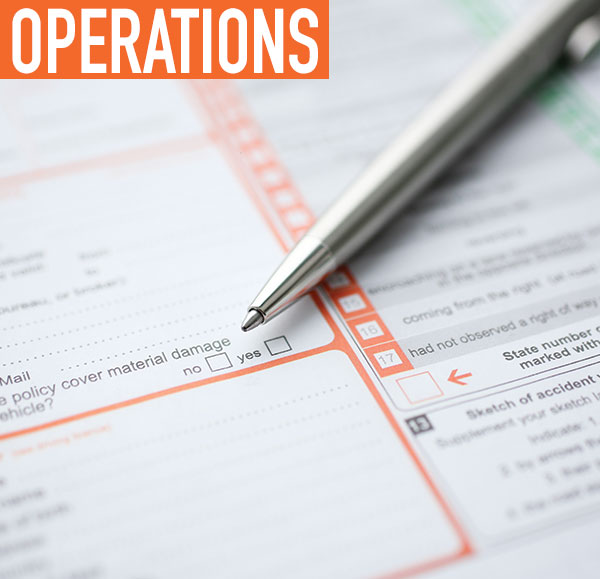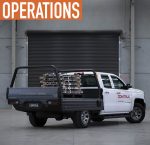By Gillian Crowl
Motor carriers incur numerous costs just to stay in business, and they often incur unnecessary costs due to out-of-service time, unexpected Federal Motor Carrier Safety Administration (FMCSA) fines, and increased insurance premiums due to the cost of litigation and unnecessary settlements after a driver is involved in an accident.
An area where motor carriers often open themselves to scrutiny is in failing to take measures to comply with the requirements of the FMCSA regulations related to hiring drivers, maintaining a driver’s driver qualification file, and documenting their efforts to comply with the regulations. Motor carriers often follow the spirit of the FMCSA regulations but do not have the proper documentation to prove compliance in the event of a US Department of Transportation (DOT) audit or to provide documents to counsel after an accident. The penalty for failing to comply and document the compliance can result in thousands of dollars in fines or increased litigation exposure that forces insurance companies to settle sometimes questionable claims. However, taking measures to gather and preserve records early can not only avoid downtime and fines after an audit, but also decrease exposure should the motor carrier find itself in litigation.
QUALIFICATION
The FMCSA regulations require a driver qualification file be maintained and contain the following:
- Driver’s application for employment
- Inquiry into previous employers
- Inquiry into driving record for last three years
- Annual inquiry and review of driving record
- Annual driver’s certification of violations and annual review
- Driver’s road test and certificate (or the equivalent)
- Medical examiner’s certificate
- If granted, a waiver of physical disqualification for a person with a loss or impairment of limbs (49 CFR 391.51)
TIP:
If you hire experienced drivers, ask if they have a certification of a road test completed in the last three years. The FMCSA regulations require a road test be performed or the motor carrier obtain a certification of a road test completed in the last three years. The FMCSA regulations also require that the driver receive a copy of the certification. Therefore, it is possible a new hire has a valid certificate for their file without needing to undergo another road test.
Although not a required component of the driver qualification file, motor carriers should also include the driver’s pre-employment drug screen and proof of the driver’s receipt of the motor carrier’s drug and alcohol policy in the driver qualification file. Even company owners/owner operators are required to maintain a driver qualification file on themselves if they have a commercial driver’s license and operate a commercial motor vehicle.
The most common document creation and preservation issues motor carriers of various sizes experience are failing to send or document inquiries to prior employers, failing to obtain or preserve records of the driver’s pre-hire driving record, failing to conduct or document the road test and certificate, and failing to perform annual certifications of the driver’s violations and driving record. These document creation and preservation tips can help avoid violation of the regulations.
ROAD TEST
Before a driver can operate a commercial motor vehicle, the driver must complete an application, pass a drug test, provide a medical card, and undergo a road test. Motor carriers rarely fail to comply with the first three requirements, but often fail to perform and document the road test and complete the road test certification. The road test is a frequently overlooked component of the driver qualification file yet the easiest requirement to follow. The requirements of a road test, along with the language for the certificate of road test, can be copied from the regulation (49 CFR 391.31).
However, because most motor carriers only hire experienced drivers, road tests seem unnecessary. By setting aside an hour of the usual onboarding process, a motor carrier can easily complete and document a road test. If the driver needs to shadow another driver or be introduced to the route before they are allowed to operate the commercial motor vehicle independently, meet an hour early to perform a road test and document it for the driver qualification file.
REQUEST DOCUMENTATION
The FMCSA regulations allow motor carriers 30 days to send inquiries to prior employers and get a motor vehicle record. Document any effort to contact prior employers, even if you have prior experience with the driver. Hiring a driver from a reputable competitor or having familiarity with a driver’s ability is not enough. Documentation of contact to prior employers, even contact made in person or by phone, is a required part of the driver qualification and must be maintained for the duration of the driver’s employment, plus three years. A good faith effort is required, so keep proof of any attempts to contact, such as a fax cover sheet, even if no response was received.
Motor carriers also have 30 days after hire to request a copy of the driver’s three-year driving history. While using a third party to obtain the records is appropriate, a copy of the report must be kept by the motor carrier. For example, insurance brokers often obtain a driving history in the process of determining whether hiring a driver will impact the motor carrier’s insurance. However, even if an insurance company insures the driver or the broker informs the motor carrier that no violations were found, there is no substitute for having a copy of the driving history in the driver’s qualification file. When using third parties, have them send a copy of the driving history for review and place a copy in the driver’s file. The driving history obtained prior to hire should be kept in the driver qualification file for the duration of the driver’s employment, plus three years.
ANNUAL REVIEWS
It is easy to forget to obtain annual certifications, especially for a driver who is performing well. Schedule a consistent, easy-to-remember time to perform annual reviews of all drivers, such as the company’s insurance renewal date, to ensure the annual reviews are conducted.
START ANOTHER FILE
After an audit, the DOT requires the motor carrier to take steps to comply with the FMCSA regulations. If a driver has been employed for some time with an incomplete driver qualification file, start over now instead of waiting for an audit or the moment the driver is involved in an incident. Prepare a duplicate driver qualification file that adheres to FMCSA regulations: obtain an updated application and driving history, perform a road test, send the driver for a pre-hire drug screen, contact prior employers, and create a separate file for each driver in the event of an audit or need to produce documents.
For motor carriers, it is imperative for the protection of the driver and company to take proactive steps to ensure compliance with FMCSA regulations. Do not wait until faced with an audit or records request from an attorney to obtain this information
About the author:
Gillian S. Crowl is an attorney with Swift, Currie, McGhee & Hiers, LLP, practicing in the areas of trucking litigation, commercial litigation, catastrophic injury, wrongful death, insurance coverage, premises liability, and bad faith litigation. Crowl represents trucking and insurance companies and corporations as well as self-insured and small business clients. She can be reached at gillian.crowl@swiftcurrie.com.




